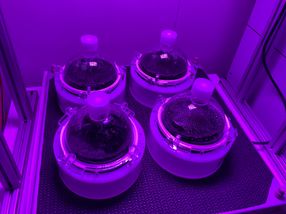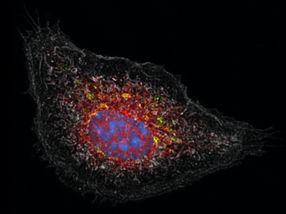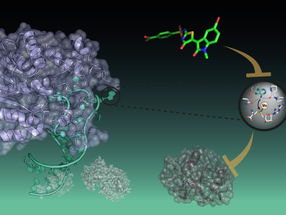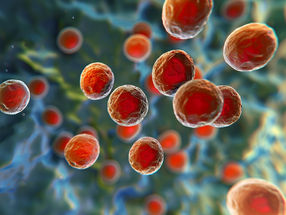New strategies against the antibiotics crisis
Evolutionary principles improve treatment efficacy
One of the most serious threats to public health worldwide is posed by antibiotic-resistant pathogens. The World Health Organization (WHO) warns of the imminent beginning of a postantibiotic era in which harmless infections can no longer be treated and could once again become one of the most frequent non-natural causes of death. Decades of using various antibiotics as standard therapy have greatly reduced the spectrum of effective antibacterial drugs. At the same time, the development of new drugs is being partially reduced or completely discontinued. This is due to the rapid evolution of antibiotic resistance, which makes antibacterial drugs ineffective within short time periods. For some years now, researchers have therefore attempted to develop strategies to maintain or even improve the efficacy of existing antibiotics.
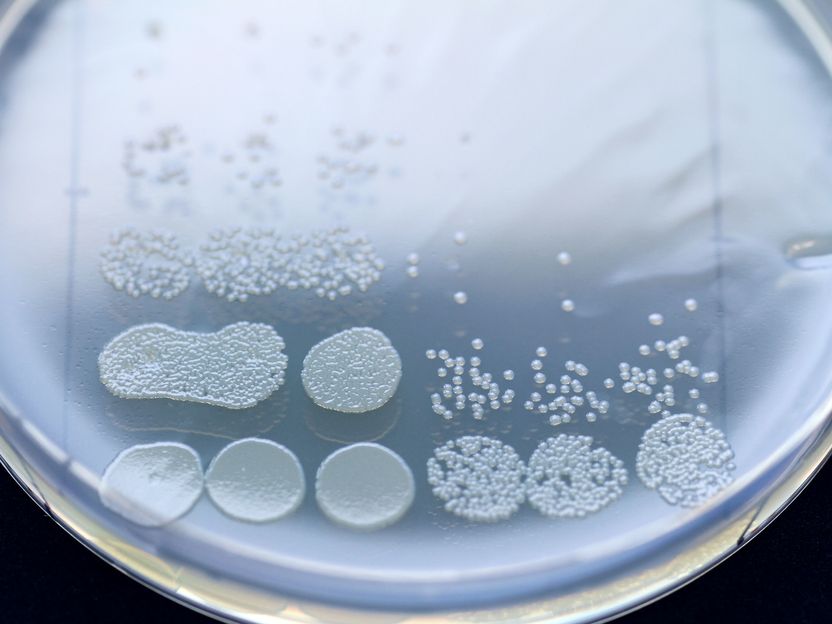
Experimental combination therapy: Three columns to the right demonstrate strongly reduced bacterial growth as a consequence of changing between different drugs.
© Christian Urban, Uni Kiel
At the Kiel Evolution Center (KEC) of Kiel University, Germany, the Schulenburg lab develops and investigates evolution-based strategies with the twofold aim to eliminate bacterial pathogens and also minimize evolution of drug resistance. A promising principle that the KEC researchers apply is collateral sensitivity. This technical term describes the occurrence of advantageous, evolutionary 'costs' for the development of antibiotic resistance, which always arises when the evolution of resistance to one particular antibiotic makes the pathogens highly sensitive to a second drug. Using the bacterium Pseudomonas aeruginosa as an example, the researchers have now used evolution experiments in the laboratory to assess the stability of this principle over time and thus its suitability for sustainable patient treatment. In their most recent publication, the KEC research team was able to demonstrate that treatment efficacy depends on the order in which the antibiotics are applied and the mode of action of the used drugs.
Does the treatment sensitivity of the bacteria remain stable?
In a previous study, the Schulenburg lab systematically investigated the efficacy of alternative antibiotic combination therapies. For these studies, they already used the pathogen Pseudomonas aeruginosa, an infectious bacterium that is particularly dangerous for patients with a weakened immune system. They were the first to demonstrate the principle of collateral sensitivity for this pathogen. Moreover, they found that the antibiotic treatments were particularly effective, when a so-called aminoglycoside antibiotic was alternated with a betalactam antibiotic, thus a penicillin-like drug. "On the basis of this preliminary work, we now wanted to find out whether this promising principle can be successfully applied under temporally changing conditions and whether the evolved high sensitivity of the germ remains stable," emphasizes Kiel professor and KEC spokesperson Hinrich Schulenburg.
In the work now presented, the Kiel researchers were able to show in comprehensive laboratory experiments that the suitability of the collateral sensitivity principle depends on several factors: In particular, the order of the antibiotics used, the evolutionary costs for the evolved resistance and also the underlying genetic mechanisms determine the treatment efficacy. "The pathogen’s ability to adapt was particularly constrained when the treatment included a drug change from an aminoglycoside to a betalactam, i.e. a penicillin-like substance," explains Dr. Camilo Barbosa, first author of the study. In this case, the bacteria were unable to adapt and went extinct as a result of the combined administration of the antibiotics. In other drug combinations, however, the pathogens were able to develop new multiple resistances. Moreover, the evolutionary costs of resistance play an important role in therapy success.
Basis for evolution-based antibiotic therapies
The new research results from the KEC scientists on the stability of collateral sensitivity may allow the development of novel and sustainable antibiotic therapies in the future. The effects of changing certain drug classes and the impact of evolutionary costs on the development of resistance impressively demonstrate the enormous potential of evolutionary principles for the design of new, sustainable antibiotic therapies. "In a next step, we plan to further develop these promising evolution-based strategies for their application on patients and here take advantage of the highly collaborative environment among basic scientists and clinicians in Northern Germany," concludes Schulenburg.
Original publication
Camilo Barbosa*, Roderich Roemhild*, Philip Rosenstiel and Hinrich Schulenburg; "Evolutionary stability of collateral sensitivity to antibiotics in the model pathogen Pseudomonas aeruginosa"; eLife; Published on 29 October 2019; (*these authors contributed equally to this work)




